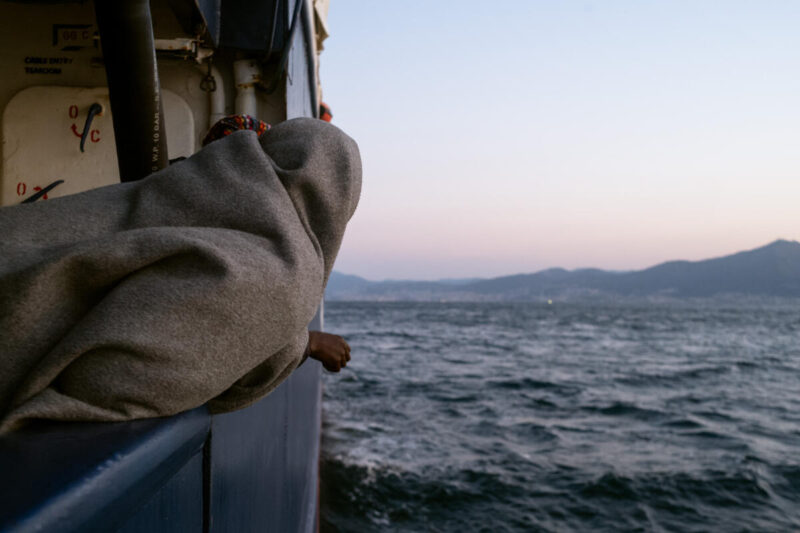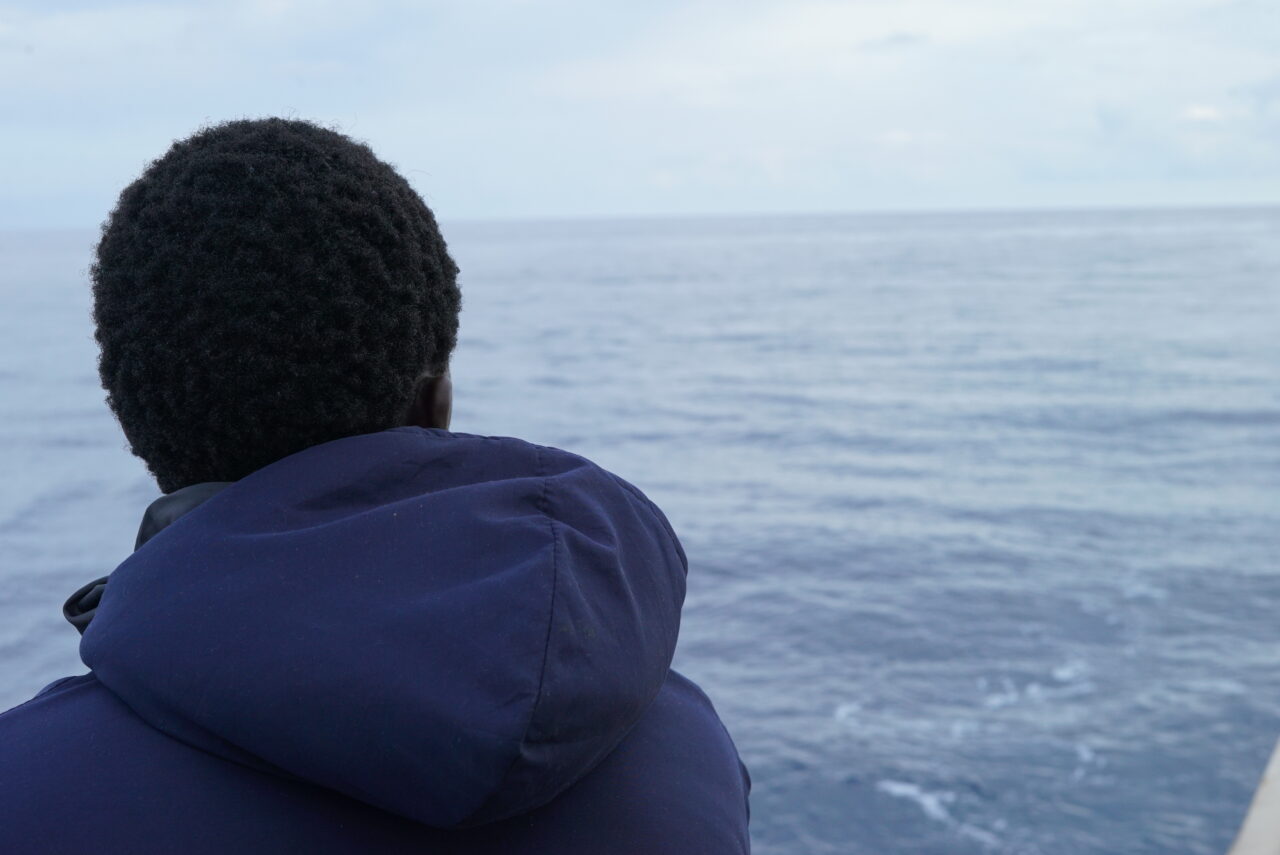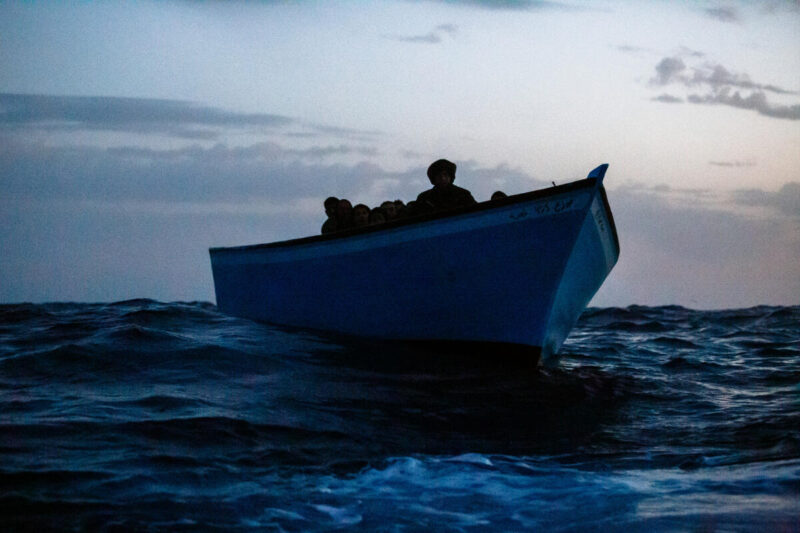“The Tunisian Coast Guard took them back to the desert.”

Thibaut* was rescued by the crew of Humanity 1 during our 18th mission. The 17-year-old survivor from Guinea shared his story with us.
*for the safety of the person changed name
Guinea-Conakry
When I was a very young child in Guinea-Conakry, I was six months old, my mother, who had been driven away by my father, left me and my older brother. We were taken in by my grandmother, who raised us, but then I got a godfather who gave me his name, which caused me a lot of problems because he already had children and a wife, who mistreated us. We were forced to sell sweets at the market, clean the house and we couldn’t go to school.
We ran away, my older brother joined a gang to feed us, and we started sleeping on the streets at the market. I will never forget what he did for me. After various petty crimes, my brother spent three months in prison, and I was taken into custody at the police station. I was only eight years old. We went back to my dad’s place and then my grandma took us in until I was thirteen (2021), when she died of diabetes and I didn’t know anyone.
My dad left us with the neighbours, but my brother decided we should go on an adventure to Italy to make a living. In Africa, there are no jobs, there are no wages. What’s more, there was no one to support us in our studies, to guide us, to help us think… In Europe, it’s different. My brother also borrowed money from an acquaintance and organised the robbery of a garage. We gave the money to my aunt, who knew we were leaving, so that she could send it to us in instalments while we were on the road. We took a taxi from Conakry to Mali, a boat to the capital Timbuktu, then a pick-up truck to the border between Mali and Algeria. There, some Guineans explained to us what adventure was, life in the jungle, and that only the strongest survive. Then we took a ‘mafia taxi’ that traffics people through the desert, tied up in the back. The police arrived and we had to hide on the ground, then we walked for several days in the desert.

But then we ran out of food and we had no water, and we were thirsty. Very thirsty. Three people died. My brother fell to the ground, exhausted, unable to walk: he died of thirst.
His last words to me were to keep going, to save my life and get to Italy. I blessed him and had to leave his body in the desert. I ran back to catch up with the others.
Border between Algeria and Tunesia
Then I crossed the border between Algeria and Tunisia. I didn’t have a penny to my name, but I met a Guinean man. He saw how young I was and I told him that my brother had died in the desert. He took pity on me and paid for my transport to Tunisia, to Sfax. But there I heard about the raids, the prisons and the deportations of black people to the Libyan desert.
I followed some Cameroonians, then went to a Guinean woman who was waiting to board a boat. Someone told me that the Arabs were building small boats with engines, and an Arab person helped me. I had no money, I had lost my brother in the desert. I don’t have my father’s or mother’s phone numbers. I was told to wait for a boat to leave. But the Tunisian coastguard caught them at sea and took them back to the desert. The person I knew left for Algeria with his wife and worked there for about three months. He earned a little money. I waited for the second boat to leave. But we didn’t get very far and the coast guard took the engine and our phones and brought us back to the coast.
On my second attempt with the third boat, the Tunisian coast guard caught up with us off the Kerkennah Islands and took us back to the desert. I then decided to go and work for a few months in Tunis in a carpentry workshop and was able to buy a phone to call my aunt – I don’t have my father’s number. On the road south, I was attacked because we were black and they took all the money I had earned in Tunis. But I didn’t give up hope and returned to the coast at Sfax. In the middle of the night, I boarded a boat for the third time. An Arab man put us on board, started the engine and wished us good luck. There were Syrians on the boat. When we saw the blue sea, we realised we were in international waters. The battery on the captain’s phone, which had a compass, was dead, and we didn’t know which way to go. We stayed like that for hours at sea. Water started coming into the boat, and we emptied it out with cups. The engine was broken. The weather had changed. We stayed like that for a few days without food. The water was empty. Everything was gone.

I have to get to Italy. I have to keep going ahead at all costs.
A woman died on the boat. No one dared touch her because she was dead. It was the first time they had ever seen a dead body. But I had already seen my brother die, so I said we had to perform a ritual and throw the body into the sea. That’s what I did. Then I said I was going to swim and push the boat to Italy because the engine was broken. So I went into the water to push the boat, first on my own, then others joined me. We pushed the boat, we were tired. I saw babies crying and women drinking sea water. It moved me. I went back down to push the boat on my own. I told the others to help me because otherwise the National Guard would have caught up with us and taken us back to Tunisia. I saw a plane circling above us and then flying away. I thought we were going to be saved. We pushed the boat some more. And you saved our lives. That’s what my brother wanted. I’m happy because I’m going to Italy to work and earn money to help my father and play football. Where does my strength come from? From the fact that I left Guinea with my brother. Without my brother, I can’t go back alone. I have to get to Italy. I have to keep going ahead at all costs.


